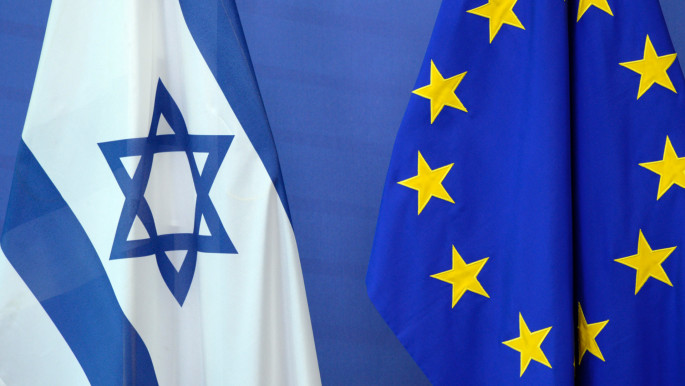What a Biden presidency means for US ties with Israel
With the election of Joe Biden as the 46th president of the United States, a change in the White House's modus operandi appears to be certain.
How the latter pertains to foreign policy is of particular interest to the Middle East. Here, America's allies wonder what the implications of Biden's promised return to multilateralism and normative values will mean, including Israel.
For the past four years, the Trump administration has granted Israeli Prime Minister Benjamin Netanyahu's every wish, strengthening Israel's position in the Middle East to an unprecedented degree.
Trump recognised Israel's sovereignty over the Golan Heights, which the country captured from Syria in the 1967 Six-Day War, recognised Jewish settlements in the occupied West Bank, and moved the American embassy from Tel Aviv to Jerusalem.
His Middle East peace plan, the "Deal of the Century," mirrored the Israeli right-wing's every demand, with some even labelling it a "two-way pact" between Trump and Netanyahu.
In addition, Trump administered an unprecedented campaign of "maximum pressure" against Israel's chief adversary, Iran, and facilitated "normalisation agreements" between the United Arab Emirates (UAE), Bahrain, and Sudan, thus strengthening Israel's position in the region while providing highly beneficial economic cooperation.
 |
For the past four years, the Trump administration has granted Benjamin Netanyahu's every wish, strengthening Israel's position in the Middle East to an unprecedented degree |  |
Moreover, the White House ceased financial aid to the Palestinian Authority (PA) and US contributions to the United Nation's agency for Palestinian refugees (UNRWA). The Trump administration also shuttered the PLO's mission in Washington.
The result is a Trump presidency that was not merely popular with Netanyahu, but also amongst the Israeli public - with seventy percent of Jewish Israelis favouring a second Trump term over Joe Biden.
 |
|
| Read more: The future of EU-Israel relations after Biden's victory |
A return to the status quo?
It turned out differently, however. And although many in the Middle East are currently wondering about the implications of a Biden presidency, especially in relation to a likely renewed US appeasement policy towards Iran, Biden's proclivity for a paradigm shift or a reversal of Trump's Israel decisions appear rather limited.
University of Denver Professor Nader Hashemi expects a "return to the old status quo" under Biden, who, he argues, has "a very mainstream establishment US foreign policy perspective" on the Middle East, including a strong pro-Israel stance.
Indeed Biden, who described himself as a Zionist, has already emphasised that he will not reverse the decision on America's embassy in Jerusalem, nor will he revoke the US recognition of Israeli sovereignty over the occupied Golan Heights.
The president-elect also welcomed the agreement between the UAE, Bahrain, and Israel. A "historic breakthrough," he called it, before pledging to convince more countries in the region to sign similar agreements.
 |
Biden has a very mainstream establishment US foreign policy perspective on the Middle East, including a strong pro-Israel stance |  |
However, Biden has traditionally been a supporter of the two-state solution. The annexation plans of parts of the occupied West Bank, which Israeli Prime Minister Benjamin Netanyahu has promoted, could be scrapped permanently under his administration.
His position on Israeli settlements became particularly apparent in 2010 when he condemned Israel's decision to build 1,600 settler homes in Ramat Shlomo, a diplomatic calamity widely recognised as "one of the most serious rows" between the US and Israel.
At the same time, Biden is unlikely to call for substantial concessions for the Palestinians as he made clear during the Democratic primary. When Senator Bernie Sanders – an advocate for Palestinian rights - suggested that the US utilises its Israeli support as leverage and seek concessions in favour of the Palestinians, Biden called the senator's plan "bizarre."
 |
|
| Read more: Don't look to Washington for peace in Israel-Palestine |
Biden is cognisant that he will need concessions from Israel on a separate issue, namely the renewal of the Joint Comprehensive Plan of Action (JCPOA), the Iran nuclear deal. Unlike the Palestinians' fate, Biden has already made the latter the sine qua non of his upcoming foreign policy, despite Israel's settlements minister Tzachi Hanegbi arguing that a return to the deal could result in a war between Israel and Iran.
A path towards US-sponsored peace negotiations
What will mark a significant change under Biden is primarily the reversal of economic and humanitarian aid withdrawal to the Palestinians issued by the Trump White House. That includes "immediate steps to restore economic and humanitarian assistance to the Palestinian people, address the ongoing humanitarian crisis in Gaza, reopen the US consulate in East Jerusalem, and work to reopen the PLO mission in Washington," Vice-President-elect Harris said in early November.
 |
A US paradigm shift away from unconditional support for Israel towards increased prioritisation of Palestinian rights is as unimaginable under Biden as it was under Trump |  |
Unsurprisingly, PA President Mahmoud Abbas welcomed Biden's election and said he looked forward to working with the president-elect. Indeed, indicating that his three-year boycott of the White House had ended, Abbas announced that the PA would resume security coordination with Israel.
Biden is also set to rekindle relations between Netanyahu and the Democrats. Netanyahu's frosty partnership with former president Barack Obama went so far that Netanyahu felt inclined to ignore the Israeli and American partnership's fundamental rule: Washington's bipartisanship concerning the Jewish state.
 |
|
| Read more: Biden and Sisi: A favourite dictator no more? |
Netanyahu supported Mitt Romney in 2012 and spoke as the second foreign head of state ever to address Congress in 2015 - together with the Republicans and against Obama's Iran nuclear deal. The close relationship with Donald Trump and his depiction as the "greatest friend Israel ever had in the White House" could make it even difficult for many Democrats to forget.
Here, Biden's approach and the fact that he and Netanyahu have known each other for more than four decades can provide solace, albeit no carte blanche.
Nonetheless, a US paradigm shift away from unconditional support for Israel towards increased prioritisation of Palestinian rights is as unimaginable under Biden as it was under Trump. However, with the tone and diplomatic approach changing, newly US-sponsored peace negotiations will not be inconceivable any longer.
The latter notwithstanding, the president-elect has already made clear that his initial focus in office will be domestic first and foremost. The Covid-19 pandemic, which continuously reaches almost weekly apogees in the US, a severe economic crisis, and social divisions, warrant a likely postponement of any signature foreign policy action under the new administration.
Thomas O. Falk is a London-based freelance journalist who focuses on US affairs and the Middle East. He has worked for Al Jazeera, Inside Arabia, il Giornale and other outlets.
Follow him on Twitter: @topfalk



